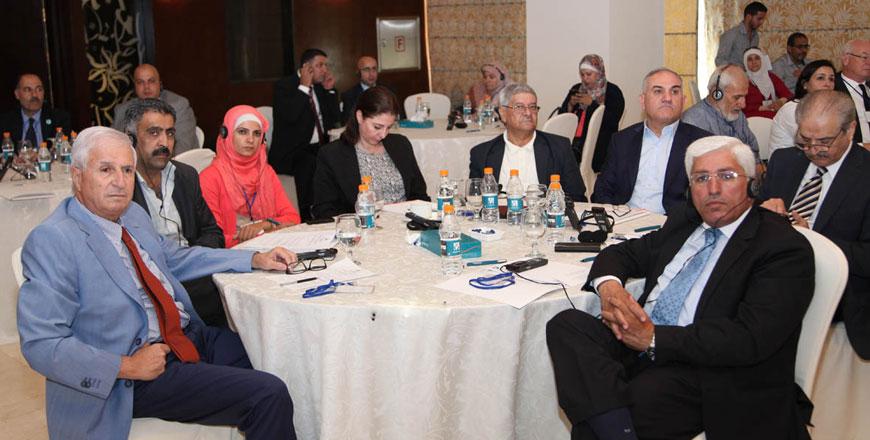You are here
Despite gov’t encouragement, parties say coalition building ‘not viable’ ahead of elections
By Laila Azzeh - Aug 01,2016 - Last updated at Aug 01,2016

Representatives of political parties attend a conference in Amman on Monday (Petra photo)
AMMAN — While the government believes that political parties will gain power and influence by forming coalitions prior to the September 20 parliamentary elections, parties still consider themselves incapable of forming such alliances.
With the increasing number of licensed political parties, which now number 49, the pros and cons of building coalitions amid a “lack of mature political, economic and social agendas” were the highlight of a conference on Monday that brought the government and parties together.
The “Coalition-Building of Political Parties towards and after Elections: Reasons, Challenges and Benefits” conference, which was organised by the German Friedrich Naumann Stiftung, revealed disparities in parties’ views over the Elections Law, the government’s financial support to parties and the likelihood of convincing citizens to head to the ballots.
“The current Elections Law is the best electoral system for political parties, whose participation in the parliamentary elections will be much better and stronger through coalitions,” said Minister of Political and Parliamentary Affairs and Minister of State Musa Maaytah.
He added that “collective efforts give parties more opportunity to reach out to voters in electoral constituencies based on programmes, while saving time and money”.
“The law is considered parties-friendly as it allows them to have social power,” said Maaytah.
Meanwhile, the vast majority of representatives of political parties attending the conference voiced frustration over the law, with some saying that it “tears apart the fabric of Jordanian society”.
Under the 2015 Elections Law, voting is based on the open proportional list at the district level.
The law stipulates that each list should include no fewer than three candidates and no more than the number of seats allocated for the constituency in which the list is competing.
Under the proportional electoral system, winning lists will be allocated seats according to the percentage of votes they received. The seats will be distributed to the ticket members with the most votes.
“The law brought us back to tribalism. Those who believe that it will produce a better parliament are deluded,” said one of the parties’ representatives.
Another highlighted that forming coalitions requires time, a “privilege parties do not have with the elections date around the corner”.
The parties also criticised the mechanism and size of the government’s financial support to parties, noting that the money given to fund their campaigns was not sufficient.
Under a by-law that regulates the funding of political parties, the government’s contribution will be JD50,000 every year with an additional amount of no more than JD50,000 if the party’s candidates run in at least 35 per cent of the constituencies and the candidates had been members of the party for at least one year before Lower House elections.
An additional JD20,000 can be provided to parties in an election year to spend on campaigning, while JD5,000 is offered to parties that form coalitions, the Jordan News Agency, Petra, reported.
The government said the by-law aimed to enable parties with clearly defined platforms to reach Parliament.
“There should be special attention to newly-established political parties in terms of financial support,” said one of the participants.
The conference included several seminars that focused on the technical aspects of the Elections Law, Germany’s experience in forming coalitions among parties and the impact of coalitions on Jordan’s parliamentary and political life.
Related Articles
AMMAN — The election subcommittee of the Royal Committee to Modernise the Political System on Sunday approved a number of articles of the dr
AMMAN — The Council of Ministers on Wednesday approved the amended draft by-law on funding political parties, the Jordan News Agency, Petra,
AMMAN — The Islamic Action Front (IAF) has agreed to field 25 lists covering every governorate for the parliamentary election, slated for Se











